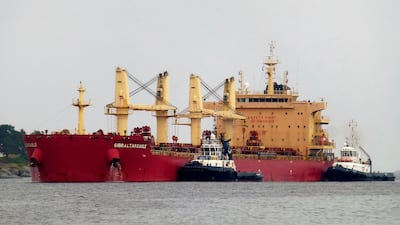A US-owned ship was hit by a missile off the coast of Yemen on Monday in an attack claimed by Yemen's Iran-backed Houthis.
The Marshall Islands-flagged MV Gibraltar Eagle was hit by an anti-ship ballistic missile fired by the Houthis off the coast of southern Yemen, reported Centcom, the US military's headquarters for the Middle East.
“The ship has reported no injuries or significant damage and is continuing its journey,” said Centcom.
The Houthis claimed responsibility for the attack, which it said was in response to "British-American aggression" and pledged to continue attacking shipping "until the aggression stops and the siege on the Palestinian people in the Gaza Strip is lifted".
"The naval forces of the Yemeni Armed Forces, with the help of God Almighty, carried out a military operation targeting an American ship in the Gulf of Aden, with a number of appropriate naval missiles, and the hit was accurate and direct," the Houthis said in a statement.
The incident was initially reported by the UK Maritime Trade Organisation, which reported it had been hit 175km south-east of Aden.
Maritime security firm Ambrey said the ship was not thought to be Israel-linked. The Houthis had previously pledged to attack Israeli-linked ships that passed through the Red Sea while Israel's war in Gaza continued.
The attack comes after days of heightened tensions following US and UK strikes against Houthi military targets in Yemen in response to the group launching months of attacks against international shipping and US warships.
The US and UK bombed more than 60 Houthi targets across 16 sites in Yemen overnight on Thursday, followed by further US strikes at the weekend.
The Houthis, who are backed by Iran and control much of northern and central Yemen including the capital Sanaa, had vowed to retaliate after the attacks and appear to not have been deterred in their campaign.
"Attacks to prevent Israeli ships or those heading to the ports of the occupied Palestine will continue," senior Houthi spokesman Mohammed Abdulsalam told Reuters on Monday.
A cruise missile was fired from Houthi territory at a US destroyer on Sunday but was intercepted before reaching its target, Centcom said.
"The missile was shot down in the vicinity of the coast of Hodeidah by US fighter aircraft," said Centcom. "There were no injuries or damage reported."

Threat against shipping
The president and deputy chairman of the Southern Transitional Council (STC), which controls much of southern Yemen and is opposed to the Houthis, called for the US and its allies to do more to stop the Houthi threat against shipping.
"The US air strikes in their current form are not enough. There should be a comprehensive approach – militarily, politically and economically against the Houthis," Maj Gen Aidarus Al Zoubadi told The National at the annual World Economic Forum (WEF) in Davos.
"The way to address this is for there to be a comprehensive military operation that involves regional stakeholders to stop the piracy operation in the Bab Al Mandeb and importantly to support ground forces, STC and PLC forces, on the ground."
Maj Gen Al Zoubadi was referring to the forces of the STC and the Presidential Leadership Council, which make up the administration that currently rules most of southern Yemen.
Qatar's Prime Minister said on Tuesday at the WEF in Davos that military strikes will not contain attacks by Yemen's Houthis on commercial shipping lanes in the Red Sea, but an end to the war in Gaza will.
Sheikh Mohammed bin Abdulrahman Al Thani described the current regional situation as a "recipe for escalation everywhere" and said Qatar believes defusing the conflict in Gaza will stop conflict on other fronts.
"We need to address the central issue, which is Gaza, in order to get everything else defused ... if we are just focusing on the symptoms and not treating the real issues, [solutions] will be temporary," he said.
Earlier, UK Prime Minister Rishi Sunak appeared to rule out further strikes. He said attacks on Houthi bases were a “single, limited action” in self-defence and the action was designed to protect international shipping.
“They fired on our ships and our sailors. It was the biggest attack on the Royal Navy for decades and so we acted,” he said.
“It was limited, not escalatory. It was a necessary and proportionate response to a direct threat to UK vessels and therefore to the UK itself.”
The Houthis launched their campaign against international shipping in response to Israel's war in Gaza in November.
They have caused major disruption to world trade, with major shipping companies opting to avoid the Red Sea – a key international waterway – due to the risk of attacks.

